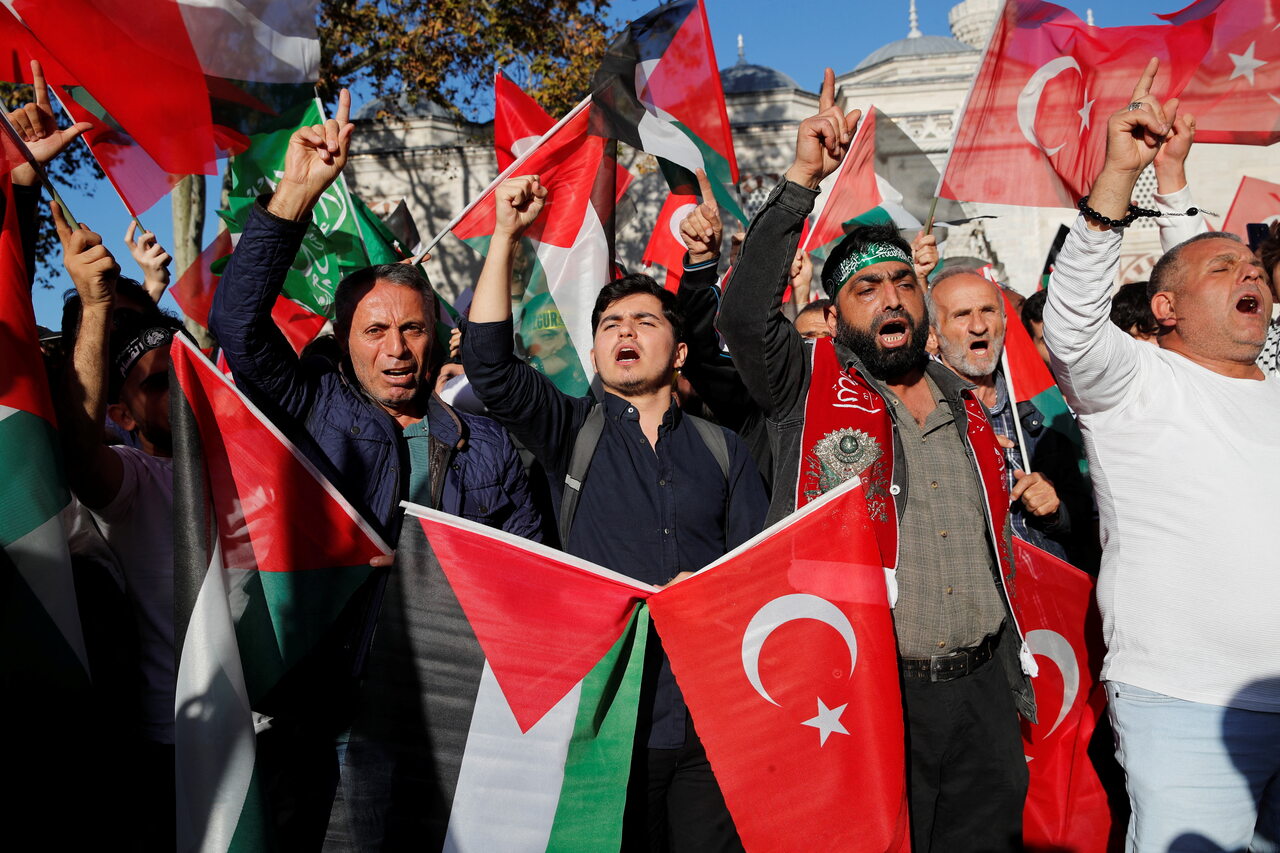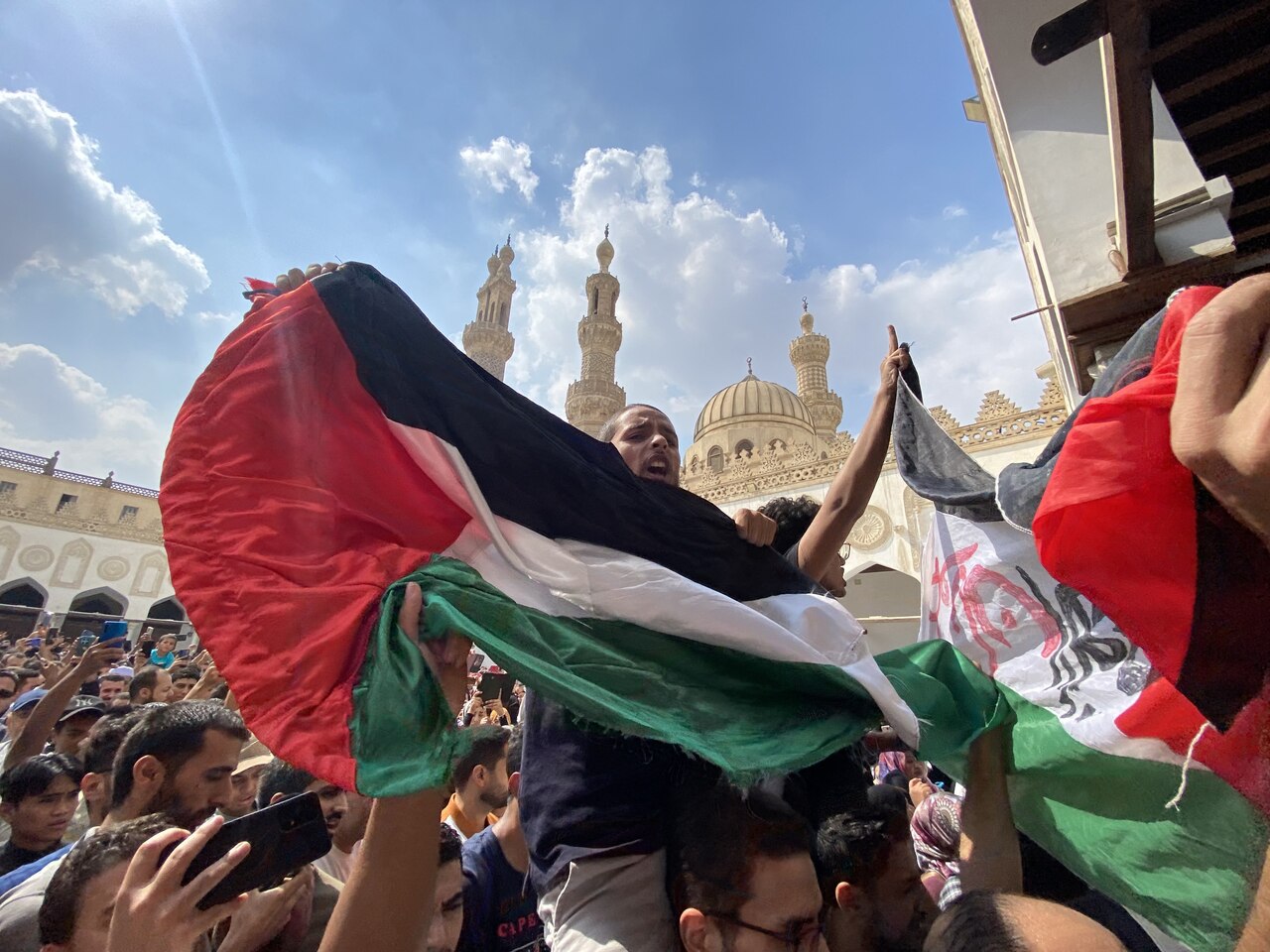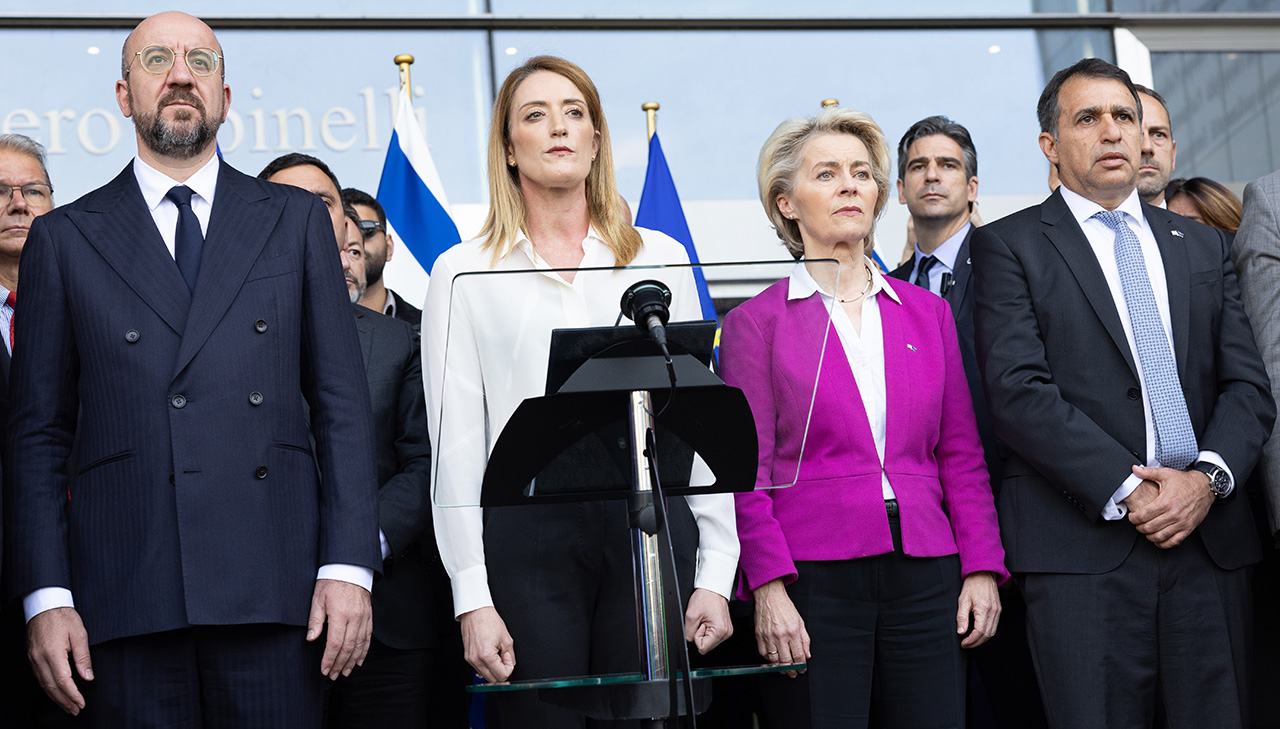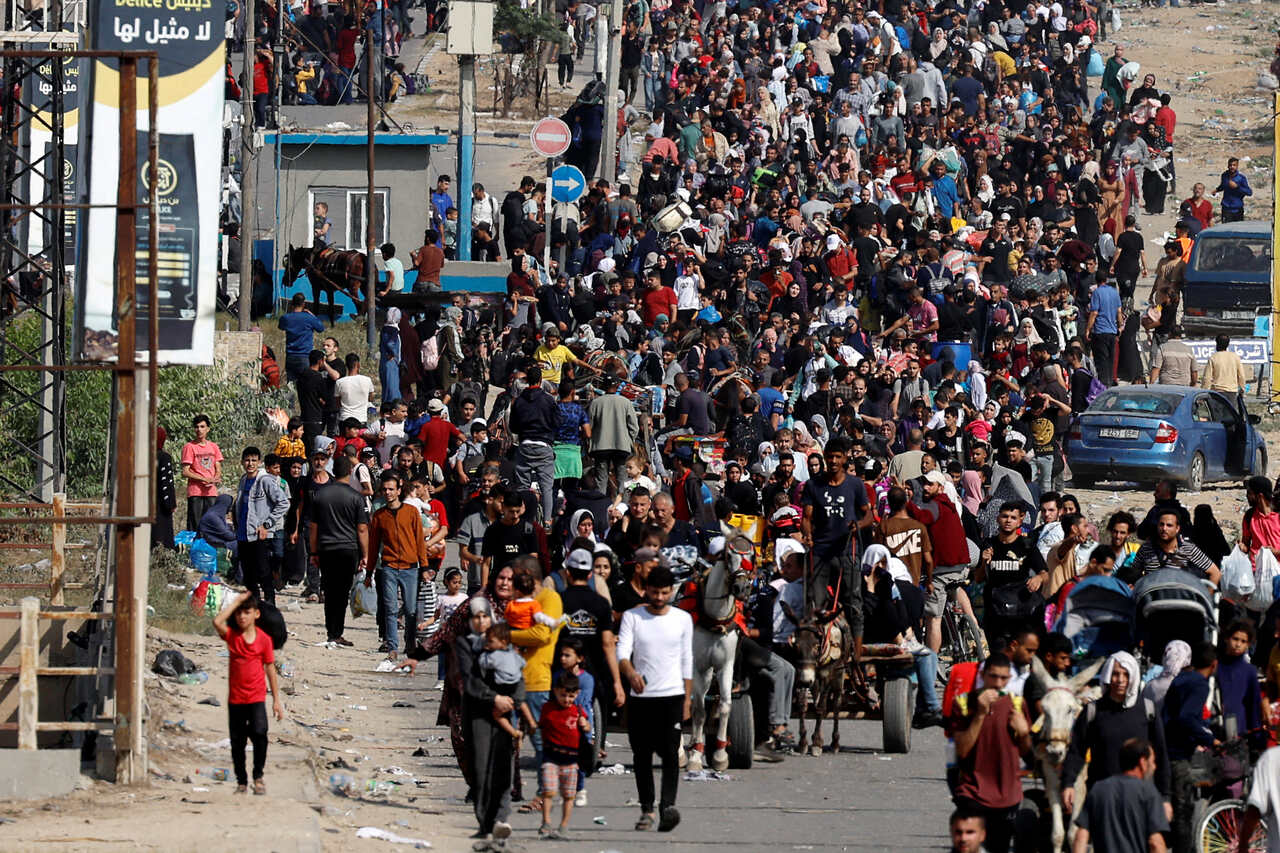Türkiye Seeks Mediator Role in Israel-Hamas War
Türkiye acts internationally as an advocate for the Palestinian cause. It does not recognise Hamas as a terrorist organisation. By criticising what it views as double standards, it joins countries challenging the Western-centric international order and tries to present itself as a country pursuing a foreign policy based on moral values. Due to its lack of condemnation of Hamas’ activities and differences with the U.S., Türkiye has limited ability to play a mediating role to end the escalation between Hamas and Israel, but it is willing to participate in a possible political solution to end the current iteration of the conflict.
 DILARA SENKAYA / Reuters / Forum
DILARA SENKAYA / Reuters / Forum
The Israeli military intervention in the Gaza Strip has led to a rise in anti-Israeli and anti-U.S. sentiment in Türkiye. As a manifestation of the growing resentment towards Israel and the United States, demonstrations were held in Istanbul and other cities and in front of the İncirlik Air Base (Türkiye/U.S.) in Adana and the Kürecik radar station (NATO) in Malatya. Despite numerous pro-Palestinian solidarity rallies, including some attended by Turkish President Recep Tayyip Erdoğan, a poll conducted in October by Turkish polling company Metropoll found that 60.9% of respondents would like the government to remain neutral or act as a mediator when it comes to the war between Israel and Hamas. If found that 18% of respondents want policymakers to support Palestine but at the same time distance themselves from Hamas. Correspondingly, 11.3% and 3% of respondents say that Turkish policymakers should actively support Hamas or Israel.
Türkiye’s Recent Relations with Israel and Hamas
During the Justice and Development Party’s (AKP) rule of Türkiye since 2002, Turkish-Israeli relations have been marked by cycles of heightened periods of diplomatic tension and attempts at normalisation. Erdoğan gained popularity in the Arab-Muslim world by ostentatiously criticising Israel during the 2009 military action in Gaza, Operation Cast Lead. In 2010. Türkiye recalled its ambassador from Israel and suspended military cooperation with the country after Israeli commandos stormed the Turkish ship Mavi Marmara, sailing with humanitarian aid to Gaza, during which nine pro-Palestinian activists were killed. After a brief improvement in relations after 2016, in 2018 the Turkish side condemned U.S. President Donald Trump’s decision to recognise Jerusalem as Israel’s capital and expelled the Israeli ambassador from the country with Israel booting the Turkish consul from Jerusalem. Full diplomatic relations between the countries were not restored until 2022 (at that time, Israeli President Isaac Herzog visited Türkiye, the first such high-level meeting since 2008). Despite positive signs in the normalisation process and Erdoğan’s September meeting with Israeli Prime Minister Benjamin Netanyahu, which included discussions on increasing cooperation in the energy sector, Israeli retaliatory military action in the Gaza Strip exacerbated Erdoğan’s criticism of Israel.
The Turkish leadership’s favourable attitude towards Hamas is part of Türkiye’s desire to play a leadership role in the Muslim world and promote an image as a defender of the disadvantaged in international forums. Hamas leaders have met openly with Erdoğan on a number of several occasions and have been allowed to operate on Turkish territory. Moreover, Hamas leader Ismail Haniyeh in 2020 and his son two years later were granted Turkish citizenship. In addition, representatives of the Israeli side point out that Türkiye provides military support to representatives of the organisation (in July this year, Israeli services seized 16 tonnes of explosives originating from Türkiye and destined for the Gaza Strip, presumably to be used in Hamas rockets).
Turkish Parliament’s Position on the Conflict
The Hamas attack on Israel carried out on 7 October this year was not condemned by the Turkish side, which was primarily due to Erdoğan’s position. On 25 October, he indicated that “Hamas is not a terrorist organisation, but a group of mujahideen who are fighting to protect their lands and homeland”. In the Turkish president’s view, Hamas represents the Palestinian national liberation movement. There is consensus in the Turkish political scene in support of Palestine. Earlier, on 17 October, all political parties in parliament signed a joint declaration condemning Israel following reports (later called into question) of the bombing of the Al-Ahli Arab hospital in the Gaza Strip. The declaration called on the international community to halt Israeli military action. The Turkish president claims that Israel is waging an “inhumane” war and that “a massacre tantamount to genocide is taking place in Gaza”. As a result, he decided in October to cancel a visit to Israel planned for this year. The minister of Energy and Natural Resources, Alparslan Bayraktar, who was supposed to discuss cooperation in gas extraction and transportation with the Israeli authorities, also did not meet with them. Citing Israel’s failure to respond to calls for a ceasefire and the “humanitarian tragedy” in Gaza, Türkiye withdrew its ambassador to Israel for consultations on 4 November. Erdoğan also announced that he no longer recognised Netanyahu as a partner and was breaking off relations with him.
The most radical stance against Israeli military action was presented by Devlet Bahçeli, leader of the Nationalist Movement Party (NMP), an AKP coalition partner. He declared that Türkiye should intervene militarily in Gaza if there is no ceasefire.
From the perspective of the Turkish authorities, the Gaza war has revealed the dysfunctionality of the decision-making structure within the UN Security Council and the crisis of U.S. leadership in international forums. A constant in Turkish foreign policy is the belief that an independent Palestinian state should be established, with East Jerusalem as its capital and the borders of the two states drawn in line with their 1967 course. Both Erdoğan and Turkish diplomatic chief Hakan Fidan argue that the international community’s actions are ineffective. Following criticism from Western institutions, Fidan has put forward the idea of establishing a system in which the states of the region (including Türkiye) would be the guarantors of Palestine’s security in a two-state system and the other states would be the guarantors of Israel. The Turkish side declares that its initiative is aimed at preventing the conflict from spreading. Türkiye, like China, Russia, and the BRICS countries, further emphasises the view of double standards in Western politics, a message that is gaining traction in the Global South. In Erdoğan and Fidan’s rhetoric, most Western countries unequivocally support Israel’s actions and are allegedly silent on the suffering of Palestinian civilians.
Conclusions and Perspectives
The escalation of Israeli military action in the Gaza Strip makes it impossible to continue Türkiye’s rapprochement with Israel, and in the long term will also negatively affect Turkish-American relations. Nor is it to be expected that the Turkish side will cease its political support for Hamas.
By criticising double standards in Western policy, Türkiye is attempting to position itself as a “moral power” and is joining the bloc of countries contesting the Western-centric international order. Because of its bias and long-standing disputes with the U.S. administration, it cannot play the role of mediator in the conflict, unlike Qatar, which maintains good relations with both the U.S. and Hamas. The initiative proposed by Fidan could find favour with some countries, such as Iran, with whom Türkiye is cooperating in the Astana format in Syria, and Qatar. It is possible that elements of the initiative could be positively addressed by Russia and China. Türkiye’s proposed guarantee system, which is an expression of its desire to rebalance the Middle East, is primarily propaganda and is unlikely to be supported by the EU. This is a result of the EU’s support for a two-state solution without preference for one side. Acceptance of the Turkish proposal would necessitate siding with Israel, which not all the Member States would agree. Israel’s prolonged military action in the Gaza Strip may lead some Palestinians from Gaza to seek asylum in neighbouring countries, Europe, or the United States. For this reason, the international community should prepare a division of responsibility for the refugees’ protection. Although the Turkish proposal for a guarantee-type system distances Türkiye from the EU, it will not affect the continuation of Polish-Turkish cooperation.




